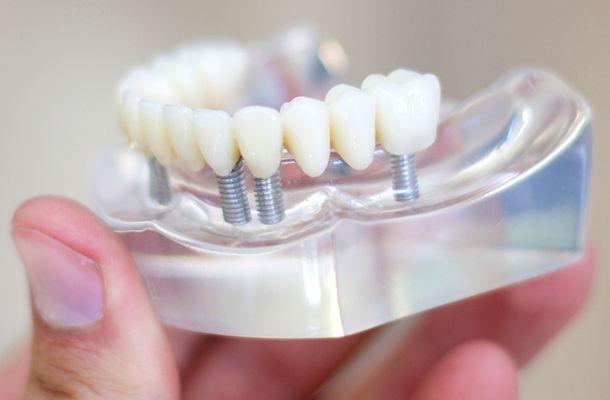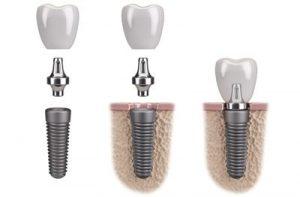Dental implants are small titanium bolts that act as an artificial tooth root, providing the base for either a crown or implant-supported denture. The result is an artificial tooth or teeth that are permanent, natural looking and far more stable and comfortable than conventional alternatives such as dentures or (tooth supported) dental bridges. *NB: New $3999 price available to new patients only.

Dental implants have many benefits:
- Prevent bone loss
- Last more than 30 years
- Increase your biting efficiency
- Eat, laugh and talk without fear of losing your dentures
- Maintain the stability of your adjacent teeth
- No more denture relines or loose dentures
Mills Road Dental is a QIP Approved Dental Clinic with highly experienced Australia-trained dentist Dr Aran Moorthy.
Abutments, crowns & dentures
Dental implants are an essential component in the process of replacing your missing teeth. However, they are only part of the story.
The dental implant is the small bolt that acts as an artificial tooth root. On top of that, your dentist may place an abutment and then a crown for just one missing tooth, or an implant-supported denture or bridge that attaches to the abutments for several missing teeth.
Preventing bone loss – a major benefit of implants
One of the major benefits of dental implants is that they help preserve the bone in your jaw.
When our natural teeth are missing, we no longer have the tooth roots stimulating the surrounding bone tissue to keep it strong. Consequently, the bone starts to waste away (resorb). This is why you may have noticed some people with missing teeth have a collapsed, ‘older than their time’ appearance.
As time passes, this continual bone loss makes it harder to wear dentures as the dentures need to be repeatedly relined to adapt to the collapsing jawbone.
Dental implants mimic the action of the tooth root by providing stimulation to the jawbone, keeping it healthy and strong.
Understanding osseointegration
Osseointegration is a process when bone tissue connects to a load-bearing artificial implant. In dentistry, this happens after your implant or implants have been inserted into your jawbone. Read more about osseointegration here >
In the following three months, before any more work is done, you must wait while your bone tissue slowly connects (integrates) to the implant, allowing the implant to become a strong, stable and permanent fixture that will function just as a normal healthy tooth would.
 NEW PRICE: Dental Implant + Crown: from $3999
NEW PRICE: Dental Implant + Crown: from $3999
Get a dental implant (including placement), abutment and Australian-made crown for just $3999. Health insurance rebates may also apply.
NB: Our dental implants are now placed using keyhole surgery. This means there’s no pain during and after placement, and you only need only 1-2 days post-op down time.
TERMS & CONDITIONS
- Dental implants may not be suitable for all patients and will only be administered at the discretion of the dentist.
- $4990 price available for new patients only
- Any surgical or invasive procedure carries risks. Before proceeding, you should seek a second opinion from an appropriately qualified health practitioner.
The implant placement procedure
STEP ONE: Initial Consultation
Here, you can discuss your condition with your dentist and explore treatment options. The dentist will thoroughly examine your teeth and jaw, including photos, scans and x-rays, before presenting you with treatment options and answering any questions you may have.
You’ll be given a fully itemised quote for your proposed procedure. If you have private health insurance, we can use our HICAPS machine to ascertain your exact rebate entitlement.
If you decide to go ahead with the procedure, our team will book the implant procedure for you.
STEP TWO: Implant insertion
Usually, your dental implant will be inserted in a dentist’s chair at a specialist dental clinic. The procedure is relatively quick, and you’ll be given plenty of anaesthesia or even additional sedation if preferred.
STEP THREE: Osseointegration
You’ll be required to wait approximately three months for your bone cells to knit to the implant through a process known as osseointegration.
STEP FOUR: Attachments
This is the final stage of your procedure where you are given the appropriate attachments and devices to give you your new permanent tooth or teeth. If you have only one missing tooth, your dentist will add an abutment and crown, while if you have several teeth missing you’ll be given your partial or full implant supported dentures.
Talk to our dentist about dental implants today!
Bite, chew, talk freely again…
Call: 9398 3930 Book Online Send us an email
Helping patients from Maddington, Gosnells, Thornlie, Huntingdale, Rolleystone, Orange Grove, Kelmscott, Harrisdale, Martin, Kenwick, Camillo, Champion Lakes, Southern River & Lesmurdie.
Frequently Asked Questions
Are dental implants right for me?
Most people can have dental implants. If you’re in good health and are missing one, several or all your teeth, it’s likely that you’ll be a good implants candidate. However, we cannot determine your suitability for implants without seeing you in person. Sometimes, people have inadequate bone tissue and so will need a bone graft before proceeding. Other people have health issues such as cancer or diabetes which may rule out the possibility of having dental implants.
Where do you perform implant surgery?
We perform our dental implant procedures right here in our clinic in Martin, near Gosnells, which is also near the surrounding suburbs of Thornlie, Maddington, Kelmscott and Southern River.
What is the cost of dental implants?
The cost of dental implants varies considerably, and implants are only a part of the cost. You must factor in other expenses such as possible bone grafts, implant placement, x-rays, and the attachments such as abutments and crowns, or implant-supported dentures
What are dental implants made of?
Dental implants are mostly made of titanium. Titanium is very durable and strong, making it an ideal material. It also has the advantage of being biocompatible, meaning that your body does not consider it to be a foreign body and therefore won’t reject it. Consequently, the surrounding bone, nerves and tissues will form a strong bond with the implant.
Are dental implants safe?
Providing you choose an experienced and well-educated dental surgeon, dental implants are considered to be an extremely safe procedure. NB: We do not encourage patients to travel offshore for their dental implant procedures.
Why are dental implants so popular?
Dental implants are considered the best choice for many people who are missing teeth as they offer a permanent and stable solution. They stimulate the bone tissue, helping to eliminate bone loss, and allow you to return close to the function and form of your natural teeth. For example, bite efficiency is improved by up to 55%, chewing and biting hard foods is easier (consequently, nutritional intake and health often improves), the normal shape of your mouth, jaws and teeth is restored, speech is improved and results are aesthetically pleasing.
What is osseointegration?
Osseointegration is the direct structural and functional connection between living bone and the artificial dental implant. Your bone tissue can grow right up to the surface of the implant without any layer of connective tissue. Usually, after implant surgery, it takes approximately three months for integration to be complete. This process can be observed through x-ray.
How many tooth implants do I need?
The number of dental implants you need will depend on how many missing teeth you have. However, you do not need one implant for every missing tooth.
Is getting dental implants painful?
Dental implant surgery is relatively straightforward and not considered painful. These days, we use keyhole surgery which is far less invasive. Consequently, there’s no pain during and after placement, and you only need only 1-2 days downtime after your procedure.
Am I too old for dental implants?
You can have dental implants at almost any age, with the minimum age being late teens. Bone tissue may be a problem for some patients in later years; however, a bone graft or sinus lift may alleviate this problem.
Talk to our dentist about dental implants today!
Discover the freedom and improved quality of life permanent implants can bring.

 NEW PRICE: Dental Implant + Crown: from $3999
NEW PRICE: Dental Implant + Crown: from $3999